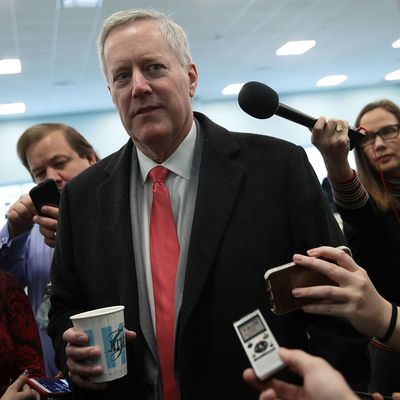
You’d think that having already resorted to four stopgap spending bills since the current fiscal year began, with another almost certainly on the way on or before February 8, Congress’s GOP leaders would fear running out of luck before getting their act together on a yearlong bill to fund the federal government. The risk of a train wreck just went up considerably with the news that a vote to increase the federal debt limit will be needed quite a bit earlier than anticipated, as Politico reports:
The Congressional Budget Office said Wednesday that the Treasury Department will likely run out of its extraordinary measures, and thus run out of cash, during the first half of March…. That’s as much as a month earlier than CBO previously projected, and the scorekeeper said it was pretty clear that the new $1.5 trillion tax cut was a big reason for the change.
All the high-fiving among Republicans over the tax bill didn’t quite take into account that the fiscal damage it wrought wasn’t just long-term, but short-term as well, with revenues dropping almost immediately.
But what makes the situation so dangerous is that earlier efforts to keep the debt-limit and government-spending votes separate could be all for naught as the former accelerates and the latter keeps getting put off. And the already difficult negotiations over immigration and defense and nondefense spending levels could suddenly get tied into the possibility of an economically ruinous debt default.
As the Washington Post notes: “The timelines for all these must-do tasks are beginning to converge, raising the possibility of one enormous deal in coming weeks wrapping all the issues up.”
And the very idea of “one enormous deal” will immediately attract hostage-takers who want to use the threat of a default as leverage for their demands. At the front of that particular line will inevitably be the conservative hard-liners of the House Freedom Caucus, who typically oppose debt-limit increases unless they are tied to domestic spending cuts. And sure enough, the HFC is already smelling an opportunity to cause trouble, as the Hill reports:
House Freedom Caucus Chairman Mark Meadows (R-N.C.) and other conservatives are negotiating with GOP leaders over attaching budget reforms to a debt-ceiling increase, but may face Democratic opposition …
“I’ve had conversations as recently as yesterday with Director Mulvaney and as recent as last week with Secretary Mnuchin on the debt ceiling, on how we can effectively make some real reforms in that area,” he said, referring to White House budget director Mick Mulvaney and Treasury Secretary Steven Mnuchin.
It’s unclear what kind of “reforms” Meadows has in mind. He’s unlikely to get what he and his caucus really want, which is an attack on “entitlements” such as Medicare and Medicaid. Both Mitch McConnell and the administration seem to have ruled those out for this year. But the other thing House conservatives have been asking for recently is to de-link the defense-spending increases they want from similar increases in nondefense spending, which normally stroll together hand in hand through Congress when the appropriations caps enacted in 2013 are breached. It’s bad enough that HFC members are threatening to vote against the next stopgap spending bill without this demand being met. If a debt default is added to a potential second government shutdown as leverage, these hard-liners could become giddy with power, and everything could get out of hand.
In general, despite its “must-pass” label, a debt-limit vote can make any congressional impasse much worse and possibly catastrophic. Given the splotchy record of the administration and the GOP Congress in the spending negotiations that have dragged on since well before the current fiscal year began last October, that’s not good news.






























